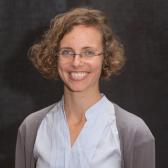
“ ‘A Rubric of Pain-Words’: Yiddish Holocaust Glossaries and Language Transformation”
Professional Background
Dr. Hannah Pollin-Galay received her PhD at Tel Aviv University (Israel) in History in 2014. Her research, which draws from both literature and history, explores the connection between language, ethics and historical imagination in Holocaust testimony. She has taught courses on Yiddish and Holocaust Studies at Ben Gurion University (Israel), and the University of Haifa (Israel) and has held a Rothschild Postdoctoral Fellowship at Columbia University. She possesses skills in English, Hebrew, Yiddish, Russian, German, and Lithuanian. While in residence at the Jack, Joseph, and Morton Mandel Center for Advanced Holocaust Studies, She conducted research on her project, “ ‘A Rubric of Pain-Words’: Yiddish Holocaust Glossaries and Language Transformation.”
Publications by Dr. Pollin-Galay include, “Avrom Sutzkever’s Art of Testimony: Witnessing with the Poet in the Wartime Soviet Union,” forthcoming in Jewish Social Studies, (accepted May 2015), “The History of My Voice: Yiddish at the Seams of Holocaust Video Testimony” forthcoming in Prooftexts (accepted March 2015), “Naming the Criminal: Lithuanian Jews Remember Enemies,” forthcoming in Holocaust and Genocide Studies 31, No. 1 (Spring 2017); “The Holocaust is a Foreign Country: Representing Geography in Lithuanian Jewish Testimony” in Dapim: Studies on the Holocaust (2013) and “Diaspora from the Inside Out: Lithuanian Jews’ Perceptions of Home and Abroad” in The Contemporary Russian-Speaking Jewish Diaspora forthcoming with Rutgers University Press (2015), Dr. Pollin-Galay is currently working on a book entitled Ecologies of Witness: Language, Place and Holocaust Testimony, which is based on her dissertation research.
Fellowship Research
For her Phyllis Greenberg Heideman and Richard D. Heideman Fellowship, Dr. Pollin-Galay studied lexicons of “Holocaust Yiddish,” written in the 1940’s and 1950’s, as both a form of personal testimony as well as a postwar cultural intervention. In these lexicons, intellectuals used philology to express a sensation of fracture and overturning. Pollin-Galay compared the intricate observations of these lexicographers against vernacular Yiddish sources from the war period—available in abundance in the United States Holocaust Memorial Museum archives; these include: early written and oral testimony, professionally published prose such as the Displaced Person Camp Journal Collection, and private correspondences of survivors available in the personal collections. She focused on words and phrases that relate to Jewish ethical codes, perpetration, and fixations with the animal world.
Dr. Pollin-Galay was in residence at the Mandel Center from August 1 to December 31, 2015.
